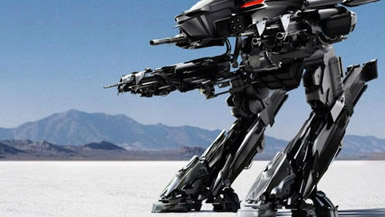Movie Review: Robocop
By Matthew Huntley
February 20, 2014
BoxOfficeProphets.com

Besides the fact this is a remake of a popular science fiction movie (and is therefore already part of our collective consciousness), the title alone should tell you everything you need to know about RoboCop. In a futuristic society, one fraught with crime, violence and cynicism, not to mention an ever-widening gap between political parties, a billion-dollar technology company called OmniCorp has engineered highly sophisticated robots, which look uncannily like the clones from the Star Wars prequels, to police the streets. The company has sold these “drones,” if you will, to nearly every country in the world - every country, that is, except the United States.
“Why is America so Robo-phobic,” screams Pat Novak (Samuel L. Jackson), the belligerent and outspoken host of “The Novak Element,” a political talk show that leans toward the left. Those opposed to robots would say it’s because machines simply can’t possess those inimitable human characteristics like instinct, reason and moral judgment. One conservative senator poses the question, what would happen if one of the robots decided to shoot a kid?
The president of OmniCorp, Raymond Sellars (Michael Keaton), desperately wants to tap into the American market, not least because the U.S. is one of the most crime-ridden of countries, and every second one of his machines isn’t out patrolling, so his advertising team tells him, OmniCorp is “bleeding money.” But a current bill prevents him from doing so, and in order to sell a machine to the American people, Sellars believes he needs to put a man inside one. He enlists the head of his science division, Dr. Dennett Norton (Gary Oldman), to make it happen. The idea is to put a physically irreparable human inside an exoskeleton, yet giving him a face and personality with whom everyday citizens can identify.
Enter Alex Murphy (Joel Kinnaman), a Detroit cop who, along with his partner Lewis (Michael K. Williams), recently stumbled across a stolen arms operation and believes men within his own unit are involved. After tucking in his son David (John Paul Ruttan), and while getting ready to make love to his wife Clara (Abbie Cornish), Alex becomes the target of a car bomb and is nearly blown to smithereens. When it’s clear he’ll never fully recover, Clara allows OmniCorp to fuse Alex’s remains, which consist only of his brain, his lungs and his left hand, with metal and hardware, making him the inaugural “RoboCop.”
One of the interesting aspects of Paul Verhoeven’s original RoboCop (1987) was that after Alex’s body was merged with machinery, he had no recollection of who he was, including his role as a husband and father. Slowly, his human memories began to surface, which gave the movie an emotional and psychological edge in addition to its action and style.
The new RoboCop has these qualities, too, only it presents them in sort of reverse order. When Alex first becomes RoboCop, his memories are intact and he’s even reunited with Clara and David. In scenes that are surprisingly well-handled by director José Padilha, we see that Alex is happy and starts to believe this could all work out. However, after he scores poorly on quality control tests overseen by OmniCorp’s military tactician, Rick Mattox (Jackie Earle Haley), the company decides to take away his human elements. And because billions of dollars are at stake, not to mention the company’s reputation, they do this without Alex’s permission.
Eventually, they let the software take over entirely and turn RoboCop into nothing more a monosyllabic automaton. This of course raises many obvious yet powerful ethical and moral questions, to which the movie pays moderate heed, and like the original, it’s able to function as a social commentary, a satire and an offbeat comedy. All of these work in the movie’s favor, as they disallow it from being categorized as just another run-of-the-mill action-thriller, at least entirely.
It’s more or less a guarantee that remakes are never as fresh as their original counterparts, and RoboCop is no different, but it has its own virtues. The movie has a constant momentum and avoids falling into the trap of rushing through its setup just to get to obligatory action sequences. At times, it actually seems more interested in its underlying idea and moral ramifications than merely using its title character for chase scenes and shootouts. I was impressed that Joshua Zetumer’s screenplay devoted as much time as it did to showing us Alex adapt to his new lifestyle and actually have the characters talk about and react to it credibly. You’d think, in this day and age, the movie would merely breeze over the science and deeper aspects of its premise just so RoboCop can race across city on his bike and track down the bad guys. That eventually happens, and the villains are your standard-issue, one-dimensional cartoons, but what the film does before and after these scenes holds our interest. Plus, the special effects and production values are sharp, slick and innovative, so at the very least, RoboCop is a pretty movie to look at.
But it’s more than just pleasing spectacle. RoboCop has a brain and heart, too. It’s atypical to say so, but this is a remake that’s actually worth seeing in addition to the original. Sure, the first one remains the better movie (it almost always is); but this is still a good one.